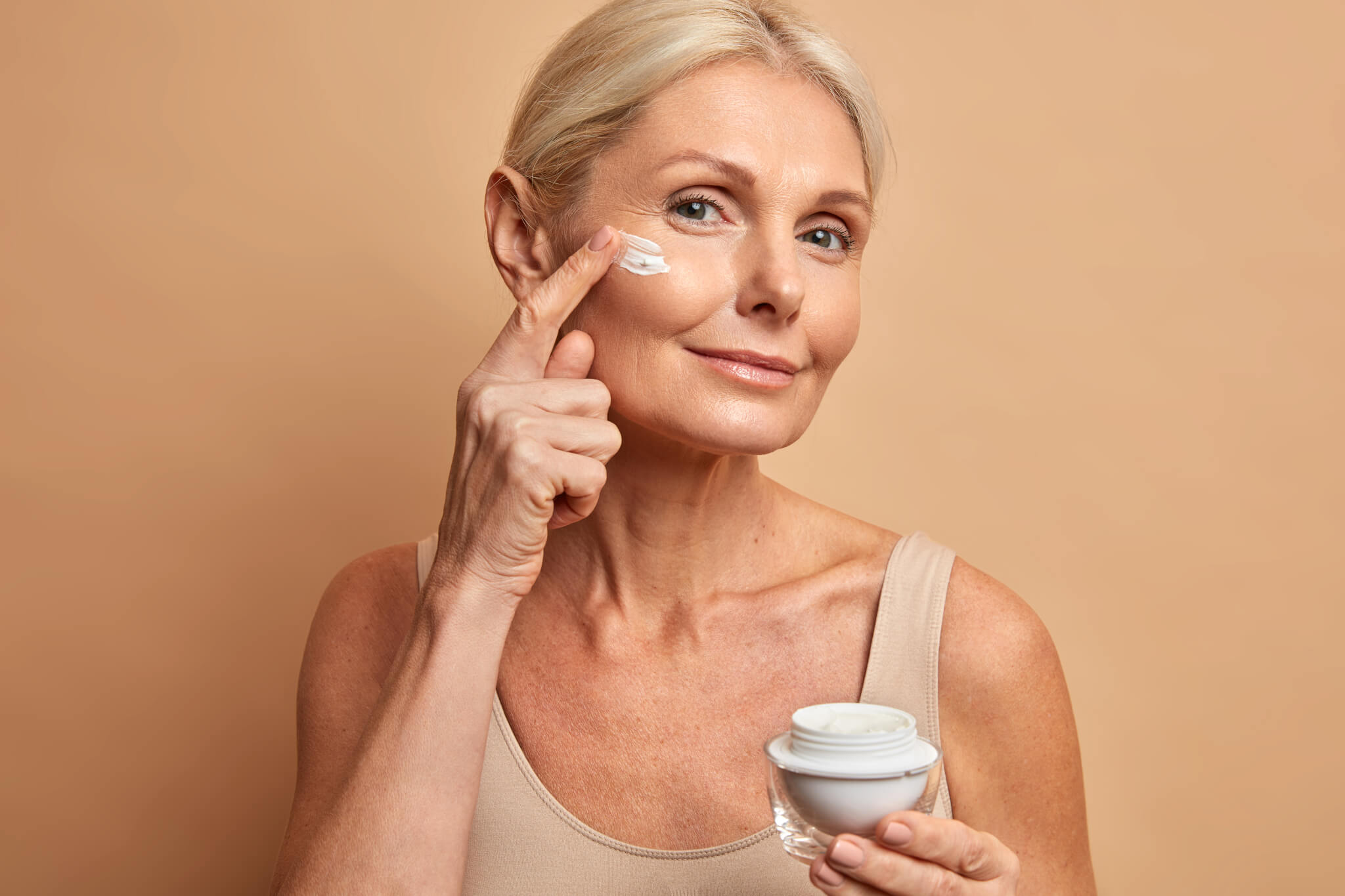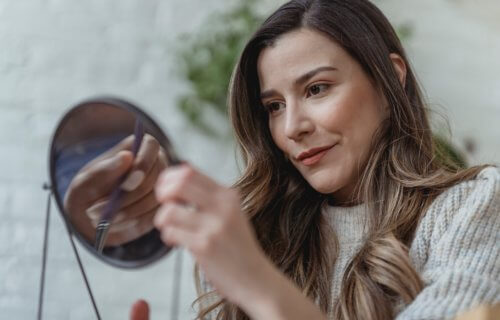Wrinkles are a natural part of the aging process. While many don’t look forward to smile lines and crow’s feet, there are healthy choices you can make to prolong the inevitable. Aside from the long list of anti-aging products on the market today, a few changes in your lifestyle may ensure smoother skin down the road with some of the best ways to prevent wrinkles.
Throughout history, women have gone to extreme measures to keep their skin taut. We suggest more practical methods (based on our research) versus painful rituals from the past like bathing in blood or getting Botox. In other words, prevention doesn’t have to hurt.
What causes wrinkles? Slow skin cell production, thinning skin layers and a lack of collagen proteins are behind it. You can get wrinkles as early as age 25 or later in life, according to the Cleveland Clinic. Collagen is a protein within your body that gives your skin structure. It provides elasticity for easy movement. Think of skin as similar to a rubber band. A beautiful rubber band you want to nourish. If that rubber band stretches too much, it loses its ability to snap back to its normal size and shape. When cells age, their ability to produce proteins slows down. This makes it more difficult for your rubber band to snap back to its original shape, which causes wrinkles.
Some research even indicates the benefits of collagen may reach far beyond physical appearance. Researchers from The Tisch Cancer Institute at Mount Sinai found increasing levels of type III collagen — the form of the protein cancer cells produce and cover themselves in — stops diseased cells from spreading.
Considering two-thirds of Americans don’t know how to properly take care of their skin, these lifestyle changes are timely reminders. These suggestions are not only the best ways to prevent wrinkles, they also protect and promote health from within. Let us know in the comments below your methods for combating fine lines.

The List: Best Ways to Prevent Wrinkles According to Experts
1. Sunscreen
Sun exposure is the most damaging to skin, according to the National Library of Medicine. And damage means more wrinkles. As you age, fine lines are inevitably going to appear, whether or not they seem to run in your family.
“The likelihood of the type of wrinkles you’ll develop and the age of onset is influenced by genetics,” Marina Peredo, MD, a board-certified dermatologist and an associate clinical professor of dermatology at Mount Sinai Hospital in New York told Oprah.com. “Your ethnicity and skin tone can make you more vulnerable to the damaging effects of UV rays, for instance. So, while you can’t stop every line and crease, factoring in your genetics can help you determine the extent of the anti-wrinkle lifestyle measures you’ll want to take, whether that includes being adamant about wearing SPF (and reapplying), maintaining a healthy weight, exercising regularly and/or avoiding consuming excess sugar.”
Skin wrinkles in response to chronic ultraviolet light exposure. All that UV light from the sun breaks down the skin’s collagen. Repeated sun exposure can lead to solar elastosis too, a skin disorder characterized by yellowed, thickened skin with deep wrinkles. “I recommend all patients use broad-spectrum SPF 30 or higher sunscreens daily,” board-certified dermatologists Samer Jaber, MD Dr. Jaber, told Cosmopolitan. “While making sure you reapply every 2 hours when you are outside.”

The American Academy of Dermatology Association recommends protecting skin from the sun every day. You can protect your skin by seeking shade, covering up with sun-protective clothing — such as a lightweight and long-sleeved shirt, pants, a wide-brimmed hat, and sunglasses with UV protection — and using sunscreen that is broad-spectrum, SPF 30 (or higher), and water-resistant.
You should apply sunscreen every day to all skin that is not covered by clothing. It isn’t just for those sunny summer days. Despite the fact that sunscreen provides proven protection against sun damage, a recent study suggests that 40 percent of Americans only deem it necessary to wear sunscreen during the summer. Not true!
2. Get enough sleep
The effects of not getting enough sleep inevitably shows up on your skin. A 2021 study of postpartum mothers found short sleep duration (defined in the report as less than seven hours) is associated with accelerated aging. That being said the Centers for Disease Control suggests adults ages 18 to 60 get at least seven hours of sleep per night for the most health benefits.
Another study compared “good” sleepers who slept seven to nine hours a night to “poor” sleepers who got five or less hours a night. The poor sleepers had more signs of intrinsic aging than the good sleepers, including fine wrinkling, loss of elasticity, uneven pigmentation and benign skin growths.
“It is important to sleep seven to eight hours a night to rejuvenate the skin,” says Debra Jaliman, MD, a New York City-based dermatologist told Health.

A survey by Sealy in the UK found that well-rested people reported having brighter eyes (42%), a brighter complexion (21%), clearer skin (20%), fewer wrinkles (17%) and improved skin condition (11%).
“Sleep is incredibly important for physical appearance,” osteopathic doctor Dr. Mikhail Varshavski tells NBC News Better. “Sleep is a regenerative process where we heal and where our neurons build strong connections. It’s like a fountain of youth that we dive in to every night.”
3. Don’t smoke
The negative influence of cigarettes on the skin was discovered more than 150 years ago, according to the National Library of Medicine. And despite half a century of public health efforts, smoking remains the single largest cause of preventable disease and death in the United States.
Tobacco companies haven’t made it easier by aggressively marketing their products to women since the early part of the 20th century. Tobacco smoke contains thousands of harmful substances that are toxic to cells, including skin cells. It promotes apoptosis, or cell death in these cells, damages blood vessels in the skin, and reduces blood flow. It affects collagen and elastin, which are elastic fibers that keep the skin plump and firm.
The World Health Organization (WHO) reports more than eight million people are killed due to smoking each year. According to WHO data, in 2025 there will be still around 1.1 billion smokers worldwide. Smoking is an undeniable risk factor for wrinkling and premature skin aging.

In a 2017 study focusing on pairs of twins in which one twin smoked and one did not, researchers noted that people find non-smokers more attractive based on appearance. “Smoker’s face” presents some characteristic features like prominent wrinkles and a grey-colored complexion. Additionally, a 2019 study found that the skin in the nasolabial folds was denser and thicker in smokers than in nonsmokers. And smoking doesn’t only negatively impact skin around the nose. Pursing the lips and squinting as the smoke irritates the eyes when inhaling also likely makes wrinkles form in the eye and mouth area, as pointed out by The Journal of Pathology.
4. Eat mangoes
Mangoes are more than just a juicy fruit to please your sugar craving. Researchers from the University of California, Davis said eating just enough of it significantly reduces facial wrinkles in women. The study showed that women with fairer skin who eat half a cup of Ataulfo mangoes four times a week see a 23 percent reduction in wrinkles within two months. After four months, they still see a 20 percent decline in facial wrinkles.
One possible reason is that mangoes are full of beta-carotene and contain antioxidants which fight off cellular damage. But who wants to wait four months? We live in a world all about instant gratification.

The American Academy of Dermatology also recommends eating a well-balanced diet to reduce effects of aging. “Findings from a few studies suggest that eating plenty of fresh fruits and vegetables may help prevent damage that leads to premature skin aging. Findings from research studies also suggest that a diet containing lots of sugar or other refined carbohydrates can accelerate aging.”
You might also be interested in:
- Best Instant Wrinkle Erasers
- Best Anti-Wrinkle Creams
- Best Eye Cream
- Best Face Moisturizers
- Best Skin Care Face Masks
Sources:
- American Academy of Dermatology Association
- Annals of Internal Medicine
- Cosmopolitan
- Health
- Healthline
- Medical News Today
- National Library of Medicine
- Rise
- WebMD
- YaleMedicine
Note: This article was not paid for nor sponsored. StudyFinds is not connected to nor partnered with any of the brands mentioned and receives no compensation for its recommendations. This post may contain affiliate links.

Exfoliate! Gentle scrubs and gentle washing does the trick. I’m 74 and everyone I meet keeps asking me “where are your wrinkles?” I don’t even have crow’s feet. Luckily, I am allergic to the sun, breaking out in hives, so I’ve had to stay out of the direct sun all of my life. I also do facials (myself, not professional ones) twice a week. Lots of moisturizers, too. I also didn’t have pimples when I was growing up. It’s a lifestyle. A rather easy one.
I do a light exfoliation every day with Olay products and have for many years. I am 84 y/o and my facial skin can pass for 60. I also use Olay regenerist moisturizer every day.